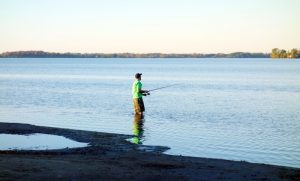
Bipartisan, bicameral legislation introduced by U.S. Rep. Dave Joyce (R-OH), U.S. Rep. Bill Huizenga (R-MI), and Sen. Rob Portman (R-OH) reauthorizing the Great Lakes Restoration Initiative (GLRI) through fiscal year 2026 became law with the president’s signature on Jan. 5.
“By signing this bipartisan legislation into law, President Trump has kept his promise to west Michigan,” said Rep. Huizenga, who serves as co-chairman of the House Great Lakes Task Force. “This new law will protect, restore and strengthen both the ecology and the economy of the Great Lakes for years to come.”
Rep. Joyce sponsored the GLRI Act of 2019, H.R. 4031, in July 2019 with Reps. Huizenga and Marcy Kaptur (D-OH). The identical Senate bill, S. 2295, was introduced in July 2019 by U.S. Sens. Portman and Debbie Stabenow (D-MI).
“I’m proud to have introduced this bipartisan bill to protect the #GreatLakes from threats like harmful algal blooms/invasive species & ensure they can continue to provide clean drinking water & jobs for millions of Americans,” Rep. Joyce tweeted on Jan. 5.
The new law also increases the GLRI’s current funding level from $300 million to $375 million in FY 2022, and increases funding by an additional $25 million each year until it reaches $475 million in FY 2026, according to a bill summary provided by Rep. Huizenga’s office.
“The Great Lakes Restoration Initiative is the lead federal program to promote the health and strengthen the economy of the Great Lakes,” Rep. Huizenga said. “Making the Great Lakes a national priority has been one of my top goals in Congress.”
Sen. Portman noted that GLRI public-private partnership has helped control some of the major threats to the Great Lakes, including harmful algal blooms, invasive species, and pollution.
“Lake Erie supports fishing and tourism industries totaling over $10 billion and is a top tourist destination in Ohio,” Sen. Portman said. “With more than 10 million people depending on Lake Erie for their drinking water and hundreds of thousands of Ohioans depending upon the Lake for jobs, we must continue to protect our Great Lakes for the economic and environmental well-being of our region.”



